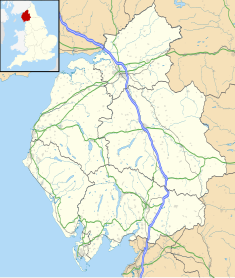
Cumbria is a ceremonial and non-metropolitan county in North West England, bordering Scotland. The county and Cumbria County Council, its local government, came into existence in 1974 after the passage of the Local Government Act 1972. Cumbria's county town is Carlisle, in the north of the county. Other major settlements include Barrow-in-Furness, Kendal, Whitehaven and Workington.
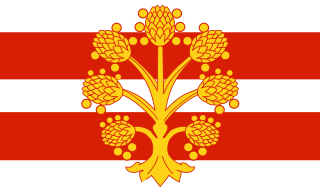
Westmorland (, formerly also spelt Westmoreland; is a historic county in North West England spanning the southern Lake District and the northern Dales. It had an administrative function from the 12th century until 1974. Between 1974 and 2023 Westmorland lay within the administrative county of Cumbria. In April 2023, Cumbria County Council will be abolished and replaced with two unitary authorities, one of which, Westmorland and Furness, will cover all of Westmorland, thereby restoring the Westmorland name to a top-tier administrative entity. The people of Westmorland are known as Westmerians.

Kendal, once Kirkby in Kendal or Kirkby Kendal, is a market town and civil parish in the South Lakeland district of Cumbria, England, 8 miles (13 km) south-east of Windermere and 19 miles (31 km) north of Lancaster. Historically in Westmorland, it is destined to be the administrative centre of the Westmorland and Furness unitary authority from 1 April 2023. It lies within the dale of the River Kent, from which its name is derived. At the 2011 Census, the town had a population of 28,586, making it the third largest town in Cumbria after Carlisle and Barrow-in-Furness. It is renowned today mainly as a centre for shopping, for its festivals and historic sights, including Kendal Castle, and as the home of Kendal Mint Cake. The town's grey limestone buildings have earned it the sobriquet "Auld Grey Town".

Appleby-in-Westmorland is a market town and civil parish in the Eden District of Cumbria, England, with a population of 3,048 at the 2011 Census. Crossed by the River Eden, Appleby was the county town of the historic county of Westmorland. It was known just as Appleby until 1974–1976, when the council of the successor parish to the borough changed it to retain the name Westmorland, which was abolished as an administrative area under the Local Government Act 1972. It lies 14 miles (23 km) south-east of Penrith, 32 miles (51 km) south-east of Carlisle, 27 miles (43 km) north-east of Kendal and 45 miles (72 km) west of Darlington.
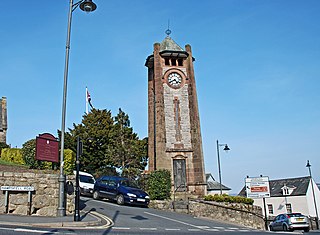
Grange-over-Sands is a town and civil parish located on the north side of Morecambe Bay in Cumbria, England, a few miles south of the Lake District National Park. In the 2001 census the parish had a population of 4,042, increasing at the 2011 census to 4,114. Historically part of Lancashire, the town was created as an urban district in 1894. Since the 1974 local government re-organisation, it has been of the South Lakeland district of Cumbria, though it remains part of the Duchy of Lancaster.

Earl of Lonsdale is a title that has been created twice in British history, firstly in the Peerage of Great Britain in 1784, and then in the Peerage of the United Kingdom in 1807, both times for members of the Lowther family.
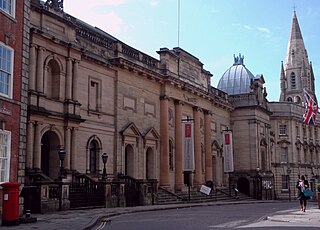
The National Justice Museum is an independent museum on High Pavement in the Lace Market area of Nottingham, England.
The Barony of Westmorland also known as North Westmorland, the Barony of Appleby, Appleshire or the Bottom of Westmorland, was one of two baronies making up the English historical county of Westmorland, the other being the Barony of Kendal. Geographically, the barony covered the northern part of the larger county of the same name, and was divided into two wards – East Ward and West Ward. It covered an area similar to that of the Eden District of the new county of Cumbria, although it did not include Penrith, which is now the administrative capital of the district.

The Victoria Law Courts is a red brick and terracotta judicial building, which accommodates Birmingham Magistrates' Court, on Corporation Street, Birmingham, England. It is a Grade I listed building.
Westmorland in North West England was abolished in 1974 following Ted Heath's Local Government Act 1972. Westmorland became a part of Cumbria along with Cumberland, parts of Yorkshire and Lancashire, including the Furness peninsular. In 2022 Westmorland was reconstituted as Westmorland and Furness following the abolition of Cumbria County Council. Westmorland and Furness have no High Sheriff as Cumbria has remained the ceremonial county.
The high sheriff is the oldest secular office under the Crown. Formerly the high sheriff was the principal law enforcement officer in the county but over the centuries most of the responsibilities associated with the post have been transferred elsewhere or are now defunct, so that its functions are now largely ceremonial. The high sheriff changes every April.

The Roseate Reading Hotel is a boutique hotel in Reading, Berkshire, England. It is situated in the Forbury, formerly a part of Reading Abbey, and on the southern side of the modern Forbury Gardens. The building that forms the front section of the hotel was the Shire Hall for the County of Berkshire, built in 1911 and used as such until 1981, and is a grade II listed building.

Reading Crown Court is a judicial facility in Reading, Berkshire. It is a Grade II listed building.

The County Offices, formerly Westmorland County Hall, is a municipal building in Stricklandgate, Kendal, Cumbria, England. The structure, which was the headquarters of Westmorland County Council from 1939 to 1974, is a Grade II listed building.
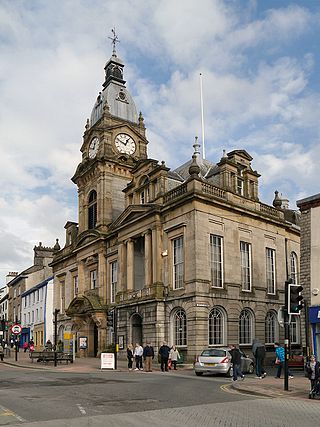
The Town Hall is a municipal building in Highgate, Kendal, Cumbria. It is a Grade II listed building. It serves as the headquarters of Kendal Town Council and also forms part of the complex of buildings which serve as the headquarters of South Lakeland District Council.

Shire Hall is a former judicial facility at Mount Folly Square in Bodmin, Cornwall. It was the main courthouse in Cornwall from 1838 to 1988. It is a Grade II* listed building.

Whitehaven Town Hall is a municipal building in Duke Street in Whitehaven, Cumbria, England. The building, which was the headquarters of Whitehaven Borough Council, is a Grade II listed building.

The Carlisle Courts of Justice is a Crown Court venue, which deals with criminal cases, and a County Court venue, which deals with civil cases, in Earl Street, Carlisle, England.
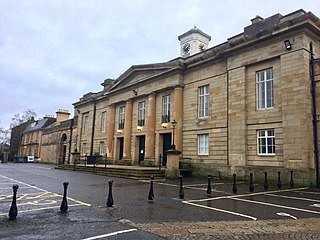
Durham Crown Court is a Crown Court venue which deals with criminal cases at Old Elvet, Durham, England. Located immediately to the north of Durham Prison, it is a Grade II* listed building.

The Moot Hall is a municipal building in Boroughgate, Appleby-in-Westmorland, Cumbria, England. The building, which is currently used as the meeting place of Appleby-in-Westmorland Town Council, is a Grade II* listed building.

